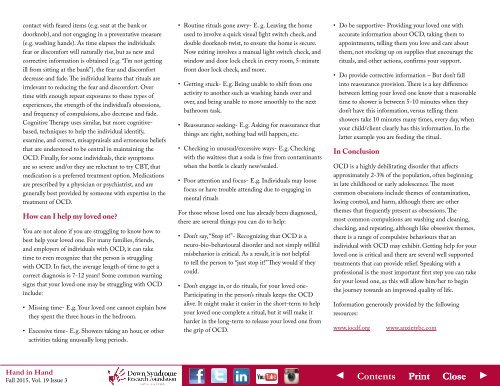Hand in Hand
HIH19-3
HIH19-3
- No tags were found...
You also want an ePaper? Increase the reach of your titles
YUMPU automatically turns print PDFs into web optimized ePapers that Google loves.
contact with feared items (e.g. seat at the bank or<br />
doorknob), and not engag<strong>in</strong>g <strong>in</strong> a preventative measure<br />
(e.g. wash<strong>in</strong>g hands). As time elapses the <strong>in</strong>dividuals<br />
fear or discomfort will naturally rise, but as new and<br />
corrective <strong>in</strong>formation is obta<strong>in</strong>ed (e.g. “I’m not gett<strong>in</strong>g<br />
ill from sitt<strong>in</strong>g at the bank”), the fear and discomfort<br />
decrease and fade. The <strong>in</strong>dividual learns that rituals are<br />
irrelevant to reduc<strong>in</strong>g the fear and discomfort. Over<br />
time with enough repeat exposures to these types of<br />
experiences, the strength of the <strong>in</strong>dividual’s obsessions,<br />
and frequency of compulsions, also decrease and fade.<br />
Cognitive Therapy uses similar, but more cognitivebased,<br />
techniques to help the <strong>in</strong>dividual identify,<br />
exam<strong>in</strong>e, and correct, misappraisals and erroneous beliefs<br />
that are understood to be central <strong>in</strong> ma<strong>in</strong>ta<strong>in</strong><strong>in</strong>g the<br />
OCD. F<strong>in</strong>ally, for some <strong>in</strong>dividuals, their symptoms<br />
are so severe and/or they are reluctant to try CBT, that<br />
medication is a preferred treatment option. Medications<br />
are prescribed by a physician or psychiatrist, and are<br />
generally best provided by someone with expertise <strong>in</strong> the<br />
treatment of OCD.<br />
How can I help my loved one?<br />
You are not alone if you are struggl<strong>in</strong>g to know how to<br />
best help your loved one. For many families, friends,<br />
and employers of <strong>in</strong>dividuals with OCD, it can take<br />
time to even recognize that the person is struggl<strong>in</strong>g<br />
with OCD. In fact, the average length of time to get a<br />
correct diagnosis is 7-12 years! Some common warn<strong>in</strong>g<br />
signs that your loved one may be struggl<strong>in</strong>g with OCD<br />
<strong>in</strong>clude:<br />
• Miss<strong>in</strong>g time- E.g. Your loved one cannot expla<strong>in</strong> how<br />
they spent the three hours <strong>in</strong> the bedroom.<br />
• Excessive time- E.g. Showers tak<strong>in</strong>g an hour, or other<br />
activities tak<strong>in</strong>g unusually long periods.<br />
• Rout<strong>in</strong>e rituals gone awry- E. g. Leav<strong>in</strong>g the home<br />
used to <strong>in</strong>volve a quick visual light switch check, and<br />
double doorknob twist, to ensure the home is secure.<br />
Now exit<strong>in</strong>g <strong>in</strong>volves a manual light switch check, and<br />
w<strong>in</strong>dow and door lock check <strong>in</strong> every room, 5-m<strong>in</strong>ute<br />
front door lock check, and more.<br />
• Gett<strong>in</strong>g stuck- E.g. Be<strong>in</strong>g unable to shift from one<br />
activity to another such as wash<strong>in</strong>g hands over and<br />
over, and be<strong>in</strong>g unable to move smoothly to the next<br />
bathroom task.<br />
• Reassurance seek<strong>in</strong>g- E.g. Ask<strong>in</strong>g for reassurance that<br />
th<strong>in</strong>gs are right, noth<strong>in</strong>g bad will happen, etc.<br />
• Check<strong>in</strong>g <strong>in</strong> unusual/excessive ways- E.g. Check<strong>in</strong>g<br />
with the waitress that a soda is free from contam<strong>in</strong>ants<br />
when the bottle is clearly new/sealed.<br />
• Poor attention and focus- E.g. Individuals may loose<br />
focus or have trouble attend<strong>in</strong>g due to engag<strong>in</strong>g <strong>in</strong><br />
mental rituals<br />
For those whose loved one has already been diagnosed,<br />
there are several th<strong>in</strong>gs you can do to help:<br />
• Don’t say, “Stop it!”- Recogniz<strong>in</strong>g that OCD is a<br />
neuro-bio-behavioural disorder and not simply willful<br />
misbehavior is critical. As a result, it is not helpful<br />
to tell the person to “just stop it!” They would if they<br />
could.<br />
• Don’t engage <strong>in</strong>, or do rituals, for your loved one-<br />
Participat<strong>in</strong>g <strong>in</strong> the person’s rituals keeps the OCD<br />
alive. It might make it easier <strong>in</strong> the short-term to help<br />
your loved one complete a ritual, but it will make it<br />
harder <strong>in</strong> the long-term to release your loved one from<br />
the grip of OCD.<br />
• Do be supportive- Provid<strong>in</strong>g your loved one with<br />
accurate <strong>in</strong>formation about OCD, tak<strong>in</strong>g them to<br />
appo<strong>in</strong>tments, tell<strong>in</strong>g them you love and care about<br />
them, not stock<strong>in</strong>g up on supplies that encourage the<br />
rituals, and other actions, confirms your support.<br />
• Do provide corrective <strong>in</strong>formation – But don’t fall<br />
<strong>in</strong>to reassurance provision. There is a key difference<br />
between lett<strong>in</strong>g your loved one know that a reasonable<br />
time to shower is between 5-10 m<strong>in</strong>utes when they<br />
don’t have this <strong>in</strong>formation, versus tell<strong>in</strong>g them<br />
showers take 10 m<strong>in</strong>utes many times, every day, when<br />
your child/client clearly has this <strong>in</strong>formation. In the<br />
latter example you are feed<strong>in</strong>g the ritual.<br />
In Conclusion<br />
OCD is a highly debilitat<strong>in</strong>g disorder that affects<br />
approximately 2-3% of the population, often beg<strong>in</strong>n<strong>in</strong>g<br />
<strong>in</strong> late childhood or early adolescence. The most<br />
common obsessions <strong>in</strong>clude themes of contam<strong>in</strong>ation,<br />
los<strong>in</strong>g control, and harm, although there are other<br />
themes that frequently present as obsessions. The<br />
most common compulsions are wash<strong>in</strong>g and clean<strong>in</strong>g,<br />
check<strong>in</strong>g, and repeat<strong>in</strong>g, although like obsessive themes,<br />
there is a range of compulsive behaviours that an<br />
<strong>in</strong>dividual with OCD may exhibit. Gett<strong>in</strong>g help for your<br />
loved one is critical and there are several well supported<br />
treatments that can provide relief. Speak<strong>in</strong>g with a<br />
professional is the most important first step you can take<br />
for your loved one, as this will allow him/her to beg<strong>in</strong><br />
the journey towards an improved quality of life.<br />
Information generously provided by the follow<strong>in</strong>g<br />
resources:<br />
www.iocdf.org<br />
www.anxietybc.com<br />
<strong>Hand</strong> <strong>in</strong> <strong>Hand</strong><br />
Fall 2015, Vol. 19 Issue 3


